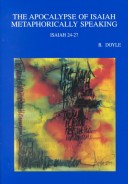Bibliotheca Ephemeridum Theologicarum Lovaniensium
1 total work
v.151
The analysis of metaphors constitutes an ideal point of entry into the exegesis of Biblical Hebrew poetic texts because it forces the exegete to examine the said text from a variety of perspectives. How can one discern the presence of metaphorical speech? What are the various types of metaphorical speech available to and employed by the biblical poet? How does the structure of a piece of Hebrew poetry carry its metaphorical dimensions? How did the biblical poet make use of the various types of metaphor and to what end? Can we ultimately gain access to the poet's meaning? The present study endeavours to provide at least a partial answer to these questions. In maintaining focus on the biblical text, moreover, the author hopes to anchor some of the abstractions of metaphorical theory with chosen examples taken from the so-called 'Apocalypse of Isaiah'. The Hebrew prophets constitute fertile ground in their use of metaphorical language for speaking the unspeakable, especially concerning the relationship between the people and God.
